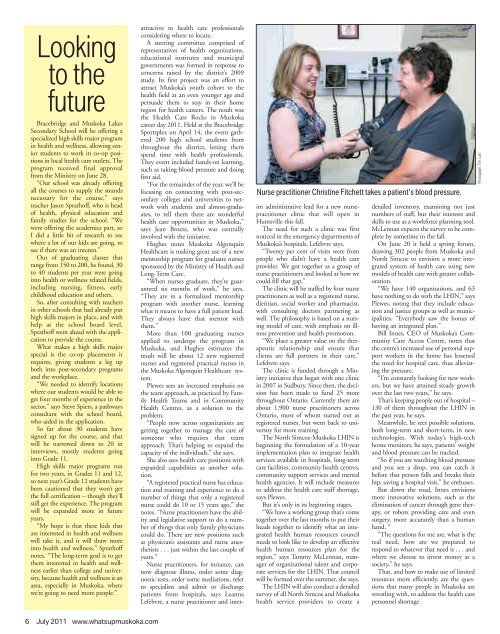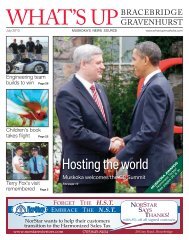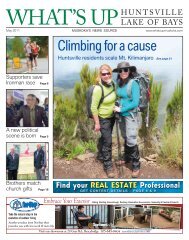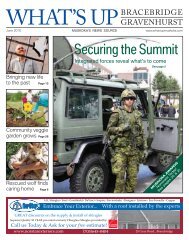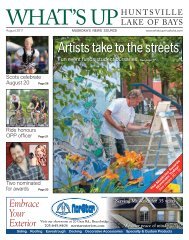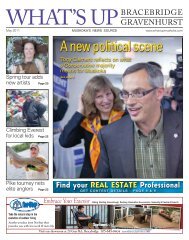What's Up Huntsville Lake of Bays July 2011 - Whatsupmuskoka.com
What's Up Huntsville Lake of Bays July 2011 - Whatsupmuskoka.com
What's Up Huntsville Lake of Bays July 2011 - Whatsupmuskoka.com
Create successful ePaper yourself
Turn your PDF publications into a flip-book with our unique Google optimized e-Paper software.
Looking<br />
to the<br />
future<br />
Bracebridge and Muskoka <strong>Lake</strong>s<br />
Secondary School will be <strong>of</strong>fering a<br />
specialized high skills major program<br />
in health and wellness, allowing senior<br />
students to work in co-op positions<br />
in local health care outlets. The<br />
program received final approval<br />
from the Ministry on June 28.<br />
“Our school was already <strong>of</strong>fering<br />
all the courses to supply the strands<br />
necessary for the course,” says<br />
teacher Jason Sprath<strong>of</strong>f, who is head<br />
<strong>of</strong> health, physical education and<br />
family studies for the school. “We<br />
were <strong>of</strong>fering the academics part, so<br />
I did a little bit <strong>of</strong> research to see<br />
where a lot <strong>of</strong> our kids are going, to<br />
see if there was an interest.”<br />
Out <strong>of</strong> graduating classes that<br />
range from 150 to 200, he found, 30<br />
to 40 students per year were going<br />
into health or wellness related fields,<br />
including nursing, fitness, early<br />
childhood education and others.<br />
So, after consulting with teachers<br />
in other schools that had already put<br />
high skills majors in place, and with<br />
help at the school board level,<br />
Sprath<strong>of</strong>f went ahead with the application<br />
to provide the course.<br />
What makes a high skills major<br />
special is the co-op placements it<br />
requires, giving students a leg up<br />
both into post-secondary programs<br />
and the workplace.<br />
“We needed to identify locations<br />
where our students would be able to<br />
get four months <strong>of</strong> experience in the<br />
sector,” says Steve Spiers, a pathways<br />
consultant with the school board,<br />
who aided in the application.<br />
So far about 30 students have<br />
signed up for the course, and that<br />
will be narrowed down to 20 in<br />
interviews, mostly students going<br />
into Grade 11.<br />
High skills major programs run<br />
for two years, in Grades 11 and 12,<br />
so next year’s Grade 12 students have<br />
been cautioned that they won’t get<br />
the full certification – though they’ll<br />
still get the experience. The program<br />
will be expanded more in future<br />
years.<br />
“My hope is that these kids that<br />
are interested in health and wellness<br />
will take it, and it will draw more<br />
into health and wellness,” Sprath<strong>of</strong>f<br />
notes. “The long-term goal is to get<br />
them interested in health and wellness<br />
earlier than college and university,<br />
because health and wellness is an<br />
area, especially in Muskoka, where<br />
we’re going to need more people.”<br />
Nurse practitioner Christine Fitchett takes a patient’s blood pressure.<br />
attractive to health care pr<strong>of</strong>essionals<br />
considering where to locate.<br />
A steering <strong>com</strong>mittee <strong>com</strong>prised <strong>of</strong><br />
representatives <strong>of</strong> health organizations,<br />
educational institutes and municipal<br />
governments was formed in response to<br />
concerns raised by the district’s 2009<br />
study. Its first project was an effort to<br />
attract Muskoka’s youth cohort to the<br />
health field at an even younger age and<br />
persuade them to stay in their home<br />
region for health careers. The result was<br />
the Health Care Rocks in Muskoka<br />
career day <strong>2011</strong>. Held at the Bracebridge<br />
Sportsplex on April 14, the event gathered<br />
200 high school students from<br />
throughout the district, letting them<br />
spend time with health pr<strong>of</strong>essionals.<br />
They event included hands-on learning,<br />
such as taking blood pressure and doing<br />
first aid.<br />
“For the remainder <strong>of</strong> the year, we’ll be<br />
focusing on connecting with post-secondary<br />
colleges and universities to network<br />
with students and almost-graduates,<br />
to tell them there are wonderful<br />
health care opportunities in Muskoka,”<br />
says Jean Broere, who was centrally<br />
involved with the initiative.<br />
Hughes notes Muskoka Algonquin<br />
Healthcare is making great use <strong>of</strong> a new<br />
mentorship program for graduate nurses<br />
sponsored by the Ministry <strong>of</strong> Health and<br />
Long-Term Care.<br />
“When nurses graduate, they’re guaranteed<br />
six months <strong>of</strong> work,” he says.<br />
“They are in a formalized mentorship<br />
program with another nurse, learning<br />
what it means to have a full patient load.<br />
They always have that mentor with<br />
them.”<br />
More than 100 graduating nurses<br />
applied to undergo the program in<br />
Muskoka, and Hughes estimates the<br />
result will be about 12 new registered<br />
nurses and registered practical nurses in<br />
the Muskoka Algonquin Healthcare system.<br />
Plewes sees an increased emphasis on<br />
the team approach, as practiced by Family<br />
Health Teams and in Community<br />
Health Centres, as a solution to the<br />
problem.<br />
“People now across organizations are<br />
getting together to manage the care <strong>of</strong><br />
someone who requires that team<br />
approach. That’s helping to expand the<br />
capacity <strong>of</strong> the individuals,” she says.<br />
She also sees health care positions with<br />
expanded capabilities as another solution.<br />
“A registered practical nurse has education<br />
and training and experience to do a<br />
number <strong>of</strong> things that only a registered<br />
nurse could do 10 or 15 years ago,” she<br />
notes. “Nurse practitioners have the ability<br />
and legislative support to do a number<br />
<strong>of</strong> things that only family physicians<br />
could do. There are new positions such<br />
as physician’s assistants and nurse anesthetists<br />
. . . just within the last couple <strong>of</strong><br />
years.”<br />
Nurse practitioners, for instance, can<br />
now diagnose illness, order some diagnostic<br />
tests, order some mediations, refer<br />
to specialists and admit or discharge<br />
patients from hospitals, says Leanna<br />
Lefebvre, a nurse practitioner and interim<br />
administrative lead for a new nursepractitioner<br />
clinic that will open in<br />
<strong>Huntsville</strong> this fall.<br />
The need for such a clinic was first<br />
noticed in the emergency departments <strong>of</strong><br />
Muskoka’s hospitals, Lefebvre says.<br />
“Twenty per cent <strong>of</strong> visits were from<br />
people who didn’t have a health care<br />
provider. We got together as a group <strong>of</strong><br />
nurse practitioners and looked at how we<br />
could fill that gap.”<br />
The clinic will be staffed by four nurse<br />
practitioners as well as a registered nurse,<br />
dietitian, social worker and pharmacist,<br />
with consulting doctors partnering as<br />
well. The philosophy is based on a nursing<br />
model <strong>of</strong> care, with emphasis on illness<br />
prevention and health promotion.<br />
“We place a greater value on the therapeutic<br />
relationship and ensure that<br />
clients are full partners in their care,”<br />
Lefebvre says.<br />
The clinic is funded through a Ministry<br />
initiative that began with one clinic<br />
in 2007 in Sudbury. Since then, the decision<br />
has been made to fund 25 more<br />
throughout Ontario. Currently there are<br />
about 1,900 nurse practitioners across<br />
Ontario, most <strong>of</strong> whom started out as<br />
registered nurses, but went back to university<br />
for more training.<br />
The North Simcoe-Muskoka LHIN is<br />
beginning the formulation <strong>of</strong> a 10-year<br />
implementation plan to integrate health<br />
services available in hospitals, long-term<br />
care facilities, <strong>com</strong>munity health centres,<br />
<strong>com</strong>munity support services and mental<br />
health agencies. It will include measures<br />
to address the health care staff shortage,<br />
says Plewes.<br />
But it’s only in its beginning stages.<br />
“We have a working group that’s <strong>com</strong>e<br />
together over the last months to put their<br />
heads together to identify what an integrated<br />
health human resources council<br />
needs to look like to develop an effective<br />
health human resources plan for the<br />
region,” says Tammy McLennan, manager<br />
<strong>of</strong> organizational talent and corporate<br />
services for the LHIN. That council<br />
will be formed over the summer, she says.<br />
The LHIN will also conduct a detailed<br />
survey <strong>of</strong> all North Simcoe and Muskoka<br />
health service providers to create a<br />
detailed inventory, examining not just<br />
numbers <strong>of</strong> staff, but their interests and<br />
skills to use as a workforce planning tool.<br />
McLennan expects the survey to be <strong>com</strong>plete<br />
by sometime in the fall.<br />
On June 20 it held a spring forum,<br />
drawing 302 people from Muskoka and<br />
North Simcoe to envision a more integrated<br />
system <strong>of</strong> health care using new<br />
models <strong>of</strong> health care with greater collaboration.<br />
“We have 140 organizations, and 63<br />
have nothing to do with the LHIN,” says<br />
Plewes, noting that they include education<br />
and justice groups as well as municipalities.<br />
“Everybody saw the bonus <strong>of</strong><br />
having an integrated plan.”<br />
Bill Innes, CEO <strong>of</strong> Muskoka’s Community<br />
Care Access Centre, notes that<br />
the centre’s increased use <strong>of</strong> personal support<br />
workers in the home has lessened<br />
the need for hospital care, thus alleviating<br />
the pressure.<br />
“I’m constantly looking for new workers,<br />
but we have attained steady growth<br />
over the last two years,” he says.<br />
That’s keeping people out <strong>of</strong> hospital –<br />
130 <strong>of</strong> them throughout the LHIN in<br />
the past year, he says.<br />
Meanwhile, he sees possible solutions,<br />
both long-term and short-term, in new<br />
technologies. With today’s high-tech<br />
home monitors, he says, patients’ weight<br />
and blood pressure can be tracked.<br />
“So if you are watching blood pressure<br />
and you see a drop, you can catch it<br />
before that person falls and breaks their<br />
hip, saving a hospital visit,” he enthuses.<br />
But down the road, Innes envisions<br />
more innovative solutions, such as the<br />
elimination <strong>of</strong> cancer through gene therapy,<br />
or robots providing care and even<br />
surgery, more accurately than a human<br />
hand. “<br />
“The questions for me are, what is the<br />
real need, how are we prepared to<br />
respond to whatever that need is . . . and<br />
where we choose to invest money as a<br />
society,” he says.<br />
That, and how to make use <strong>of</strong> limited<br />
resources more efficiently, are the questions<br />
that many people in Muskoka are<br />
wrestling with, to address the health care<br />
personnel shortage.<br />
Photograph: Tim Lum<br />
6 <strong>July</strong> <strong>2011</strong> www.whatsupmuskoka.<strong>com</strong>


